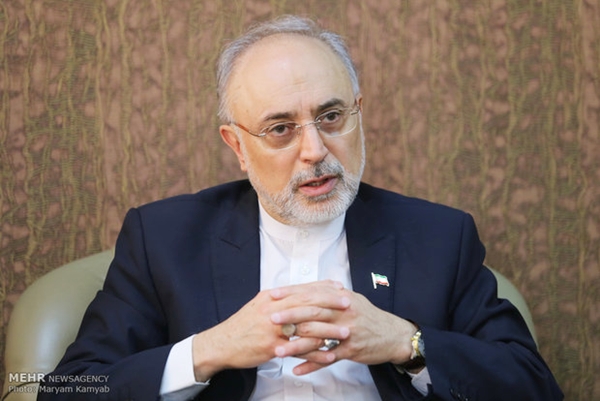In a Friday article in The Guardian, Ali Akbar Salehi, the head of Atomic Energy Organization of Iran (AEOI), stressed that the success of Iran nuclear deal depends on the West’s constructive engagement, not the destabilising policies currently being pursued in the region.
Here is the full text of the article:
Working to negotiate agreements with the west has been a mixed experience for Iran. Often, following some hard-won engagement, some western nations, whether distracted by short-sighted political motivations or the lucrative inducements of other regional actors, walk away and allow the whole situation to return to the status quo ante.
Quite a number of such reversals have befallen Iran when engaging with the US, in particular. The latest case of hard-won progress at risk – which I believe can still be saved from failure – is the historic nuclear deal known as the joint comprehensive plan of action (JCPOA). This was agreed in 2015 between Iran and the permanent members of the UN Security Council, plus Germany – the P5+1. The critical question at the present juncture is: how can we rescue this engagement and move out of the familiar vicious circle?
I believe that concentrating on three guiding principles would allow all actors to stay the course. They are as follows.
The first serious stumbling block to engagement between Iran and the west has its roots in the “security dilemma”. The actors need to clarify, for themselves and for others, whether they seek power for security or merely pursue power for its own sake. The interests of engagement are certainly better served by the former principle. Pursuing military power beyond what is called for by actual security needs raises suspicions among others and risks destabilisation. For example, US arms sales to some traditional regional clients in the Middle East, and ostentatious, lavish arms purchases by the same regional actors just because of the abundance of oil wealth, are provocative.
This is especially the case if the national defence efforts of Iran – which are partly induced by this process – are simultaneously opposed and undermined. It would be unrealistic to expect Iran to remain indifferent to the destabilising impact of such conduct.
We all need to foster a culture of adherence to commitments
The second principle concerns objective reality versus what are nowadays called “alternative facts”. Establishing the objective reality on the ground bolsters the likelihood of positive engagement. Realistic recognition of the political, economic and cultural capabilities of countries, their regional stature, and a proper consideration of their particular needs and threat perceptions helps promote and strengthen an accurate understanding of the players and their conduct.
Conversely, alternative facts are bound to create unnecessary crises, and they also render positive, effective engagement impossible. Ideas such as the “clash of civilisations”, “Sunni-Shia conflict”, “Persian-Arab enmity” and the “Arab-Israeli axis against Iran” are all examples of alternative realities fabricated for ulterior purposes.
A panoramic view of the unfortunate global situation, and particularly our violence- and crisis-ridden region, tells us that we all need to foster a culture of adherence to commitments. This is the third principle. In the absence of effective global governance, relying on this kind of culture would provide a workable basis for genuine engagement.
Neglect of or deliberate disregard for these principles will lead to chaotic behaviour by various actors and further tension and conflict, with everybody ultimately losing.
Having, on behalf of Iran, conducted the technical part of the JCPOA with the P5+1 countries, I can say with certainty that the fate of this hard-won deal depends, in the final analysis, on western resolve and adherence to the principles just mentioned. Disregard for Iran’s genuine security concerns, either through deliberate changing of the military-security balance in the region, or by stoking Iranophobia in the region and beyond, would jeopardise engagement; so would a failure to honour the specific commitments set out in the JCPOA. We would all end up back at square one. Unfortunately, as things stand at the moment in the region, reaching a new state of equilibrium may simply be beyond reach for the foreseeable future.
If our partners in the nuclear deal had a serious commitment to the three principles I have set out, we would certainly see the expansion, deepening and institutionalisation of mutually beneficial engagement. This would help promote the cause of regional and international peace and security.
The outcome of the recent presidential elections in Iran reflects the clear wish and will of the Iranian people to this end. It is, therefore, time that all our interlocutors appreciated the message as intended and acted accordingly. Engagement is not a one-way street and we cannot go it alone.
We have, so far, taken a number of solid steps towards a constructive engagement aiming at common goals and objectives. Those steps could be strengthened further by genuine reciprocal gestures and actions. The moment of truth has arrived.
